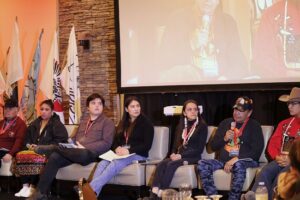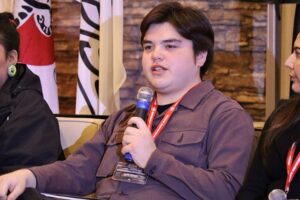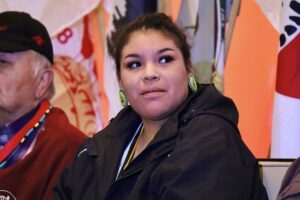Anishinabek Nation Youth Council dedicated to the personhood of the Great Lakes

By Kelly Anne Smith
NORTH BAY— During the Anishinabek Nation Councils Panel at the Anishinabek Nation’s 8th Land and Resources Forum, Kina-Gego-Naabadosin – Everything is Connected, in North Bay from February 13-15., Eshki-niigijig Advisory Council member Lance Copegog of Beausoleil First Nation talked of important work being done to protect the Great Lakes.
The panel had members from the Anishinabek Nation Getzidjig Advisory Council including Nmishomis Leroy Dolson of Munsee Delaware Nation and Nmishomis Mike Esquega of Biinjitiwaabik Zaaging Anishinabek. The panel also featured Eshki-niigijig Advisory Council members Brittnee Waindubence of Shequiandah First Nation, Terra Roy of Beausoleil First Nation, Pierre Debassige of M’Chigeeng First Nation, and Katelyn Peters of Munsee Delaware Nation.
Peters shared her perspective as urban Indigenous youth, introducing spirituality on how we view the water.
“When it comes to the people who are watching this, it doesn’t only have to be [Indigenous people], it could also be white people. Because when I was in university in my Indigenous Studies courses, there are a lot of great, amazing white people who really want to help our people and who are going to be running this country in twenty years. They need to understand why do Anishinabe people respect the water? How do they see the water because they might not be exposed to that in any other capacity.”
Copegog spoke of being gathered at the 2024 Anishinabek Nation Lands and Resources Forum because of the commitment to the lands and resources of the Anishinabek Nation’s communities. He spoke of innovative solutions that can be worked on together when facing challenges.
“We’re very committed to carrying forward some of the work we’ve started with the women’s councils such as the work on securing the personhood of water.”

Copegog explained the Eshki-niigijig Advisory Council has been working with the women’s council on the personhood of water initiative.
“We began this in the springtime of 2023. Since then, we have had a chiefs resolution that was passed to support it. We have met with former Minister Piccini (of Ministry of Environment, Conservation and Parks or MECP) and the new Minister Andrea Khanjin. We are looking to MECP for their support and for them to work with us to ensure we get this implemented because I think it’s such an important initiative to not only have the youth and the women working together on the initiative, but I think when you look internationally and at New Zealand, I think there’s a lot of good examples that we can look to for how they recognize that.”
Copegog says work has been undertaken on a program where other bodies of water have the recognition of personhood.
“Our knowledge is that water has life. I think we’re just trying to blend the contemporary knowledge with traditional knowledge. I think this conference we have today is important where we have our youth and Elders and our experts coming in to talk about how we blend both. Our panel discussion we had today is really relevant to that. I’m really interested to see what comes of it but we really are looking to MECP for their support.”
Copegog explains the personhood of nature.
“It really does mean that the body of water is recognized as a person with the legal rights that a person has. Our knowledge, our understanding of water is that it does have life. The women have their responsibility to protect water. When we talk about governance and we talk about self-determination, I think it’s so important that we’re implementing our own laws. And again Ontario, Canada, I think they can be a partner to that,” he stated. “I know we have a lot of momentum within the Anishinabek Nation politically. This is an opportunity for us to get the input from our experts in Lands and Resources. There’s momentum from Anishnabek Nation but we are not seeing that from the government. That’s where that disconnect is happening. But I know, regardless of any MECP support, we are going to work very hard to make sure we have that personhood recognized.”

“Water is life,” reminds Brittnee Waindubence of Shequiandah First Nation and a Eshki-niigijig Advisory Council member. “We carry children in our stomach. The womb has water and water is a spirit. Everything has spirit. If we didn’t have it, we wouldn’t survive. We would be nothing without our biish that’s why we need to protect it because that’s how we live. We need our biish to be clean for the next generation to come. We need to show them how to protect our water and to keep our waterways clear.”
In 2018, the Supreme Court of Colombia declared, for the sake of the future of the planet, the Amazon River to be an entity with rights to be protected, conserved, maintained, and restored. Also, New Zealand’s Whanganui River is a person under domestic law and India’s Ganges River was granted human rights.
In Canada, Quebec’s Magpie River, or Mutuhekau Shipu, has had nine rights since 2021. The Innu Council of Ekuanitshit and the Minganie Regional County Municipality declared the Mutuhekau Shipu a legal person in 2021. The Mutuhekau Shipu has the right to flow, maintain biodiversity, to be free from pollution and to sue.

